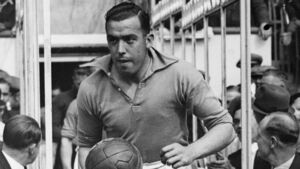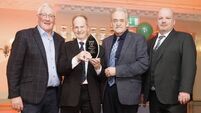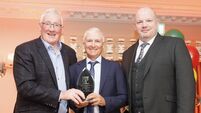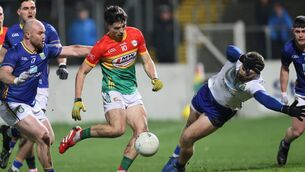As I Roved Out: From the Ha'penny Bridge to Goodison Park

Dixie Dean's goalscoring heroics have gone down in history
Ascension Thursday 1986, just beyond the Railway Bridge on the outskirts of Portlaoise. A whirr of early afternoon traffic, lots of lorries and vans on the road, plenty of cars too. One would imagine you’d have a far better chance of getting a lift than on those quiet Sunday morning’s at the same spot when there is only sporadic appearances of motorised vehicles. However, such is not the case. The Sunday morning travellers tended to move at a slower pace, a pace that allowed them time to think, maybe even give the lone figure on the footpath a lift. On a working weekday, however, the necessity to get from A to Z in a hurry saw a constant stream of transport just fly on by. And so it was that Ascension Thursday, car after car, lorry after lorry, van after van driving out of the old Maryborough at speed, only the odd few taking the time to signal that they were ‘turning off’.
Yes dear reader, your scribe is on the road again, ready to wrap yet another story around a thumbing expedition of yesteryear. On this occasion you will be surprised to learn that the story is not a hurling one though, mind you, the action picture which accompanies this week’s column will have sign-posted the fact that Association Football - to give soccer it’s official title - is the subject matter of this latest tale.
Anyway, back to the outskirts of Portlaoise. An hour, maybe little bit more of endless passing traffic has beed endured. Then a car slows down, pulls in. I open the door, “anywhere closer to Mountrath” says I, always curtailing my destination to the next nearest ‘big town’. The man nods his head. In I get and immediately put Rule No 1 of the ‘Hitchhiker’s Guide to Getting to Hurling Matches’ into operation and try to find a common interest to prolong the conversation and thereby, on occasion, prolong the journey. Little did I know how well Rule 1 was to work that day. Very early in my ‘thumbing days’ a lorry driver who gave me a lift revealed how he often stopped to pick up people thumbing but if they just sat there or were mono-syllable he would simply slow down, pull up and let them out. Anyone who knows me will testify that sitting there saying nothing or being monosyllabic is not part of my modus operandi!
So, this Ascension Thursday morning I opened on a religious note, recalling how in my schooldays the 40th day after Easter was a holy day of obligation and how we used to be delighted to get the day off before as teenagers we’d use the pretence of going to mass to enjoy a morning ‘on the town’ with our mates. That didn’t get any response. Either the driver kicked with the left foot or was a goody two-shoes, I mused. “Where are you off to?” he asks. “Limerick,” I reply, “the Munster U-21 hurling final is on down there to-night, Limerick and Clare, should be a great game,” Again my enthusiasm falls on fallow ground. A left footer alright says I to myself, then, out loud, “do you follow any sport yourself?” “I do,” says he, “soccer.” “Who do you support, Manchester United, Liverp … “ “Everton” he interrupts.
“Everton,” I repeat, then issue what were to transpire to be two magical words, “Dixie Dean.”
The driver looked at me, then turned his attention back to the road. “How do you know about Dixie Dean,” he asks, a tone of incredulity in his voice. “He scored 60 goals in a season way back in the day, a record they reckon will never be broken,” I replied, explaining I had a book about him at home that I’d bought in a second hand bookshop in Merchant’s Arch near the Ha’penny Bridge in Dublin City Centre. “’Twas a great read,” I continued, “the best story I remember from it is that Dixie Dean scored so many of his goals from headers that legend had it that the morning of an Everton-Liverpool Merseyside derby Dean and the Liverpool goalkeeper happened to meet on the street and when Dixie nodded his head in acknowledgement, the ‘keeper instinctively dived!”
The driver laughed. Then, as we neared Mountrath, he revealed not only was he a Everton fan but that himself and a few friends travelled over the club’s Goodison Park twice a season to support their beloved Toffees. Pulling up at a shop in Mountrath - he was a sales rep for a tea company if I remember correctly - he says, “tell you what, I have a good few calls to make, a lot of them off the beaten track, but if you like you can stay with me and I’ll drop you in Limerick around 5 o’clock.” With the game scheduled for 7.30pm and the prospect of a few pints in the Caherdavin Arms adjacent to the Gaelic Grounds before throw-in now a certainty I, of course, agreed. A lot of the rest of the journey was spent talking about the life and times of one William Ralph Dean and so too will the rest of this column …
The book I purchased in the Merchant’s Arch in the early 1980s was ‘Dixie Dean, The Story of a Goalscoring Legend’ and on the front of the paperback issue was a soccer card image of the the famous Birkenhead born England striker, a card image from the historic 1927-28 season, the season he scored those record 60 goals. Erling Haaland came close to that record a couple of seasons ago and it was the Norwegian’s record breaking fastest 50th Champions League goal on Thursday night last they prompted the devotion of this week’s column to Dixie Dean. Nick Walsh, the author of that first Dixie Dean biography, had, alas, passed away before it’s 1977 publication but the esteem in which Walsh, also Birkenhead born, held his subject is made crystal clear by the words he chose to close the book.
“Religious orders canonise those individuals who, by their virtuous application, enhance their cause and by their example to followers are likely to perpetually draw inspiration. Sport, which has millions of disciples… indulges in similar canonisation of its heroes. Some of the sporting saints do not last as long as their holier counterparts, because no doubt in most cases their achievements are subsequently emulated. The old saints march out and the new saints come marching in. As Dixie Dean's achievements give no sign of being surpassed, it may be safely predicted that in the context of the religion of football his name will be recognised in perpetuity as that of a saint. Amen.” The authors opening words were equally captivating … MAY 25, 1928: It’s May 25, 1928. Goodison Park. Everton are playing Arsenal in their last match of the season. The score is 2-2 with five minutes left to play. Everton are awarded a corner. The ball is floated tantalisingly across the Arsenal goalmouth and the Everton centre-forward rises to power the ball home with his head. The crowd erupts, but not only because Everton have taken the lead. Even when Arsenal equalise in the game’s dying moments, it doesn’t matter - Everton were sure of the League Championship before the game started anyway. The fact is that their centre-forward is William Ralph ‘Dixie’ Dean, only just 21 years old, and he has just scored his 60th league goal of the season. It was a record then {1928}, it’s a record now {1977}, and it will probably always be a record {still is in 2025}
Another book on Dixie Dean was published during Covid, the beautifully named ‘In the Shadow of Ben Bulben’ by Paul Little which traces the legendary scoring machine’s Sligo Rovers sojourn. Dean joined Sligo Rovers on January 25th 1939 at the age of 32 having previously played for Tranmere Rovers, Everton (395 goals in 447 appearances) and Notts County. Sligo Rovers would be his last professional club. At the time, Sligo had financial problems but anticipated a good cup run so contacted Dixie in the hope he would help their goalscoring return. To their surprise, he accepted their offer. Dixie spent four months with Sligo Rovers, playing seven league games for the club, scoring ten goals including five in a 7-1 win over Waterford in Sligo. He also played four Cup matches scoring once, in the drawn final (see photo) By scoring in the FAI Cup Final, he became the first player to score in both the FA and FAI cup finals.
While it has often been stated that Dean disliked his nickname and preferred to be called Bill, one article on ToffeeWeb, the independent Everton website, tells the tale, with photographic evidence, of one fan getting the striker to sign a copy of the Nick Walsh book. “I watched intently as he signed, noting how he signed the “x” of Dixie with two “c” shapes, rather than a cross. My mother thought at the time how neat his handwriting was. It was only recently that I realised for the first time, that the cover of the book depicts his autograph with the distinctive ‘x’.”




